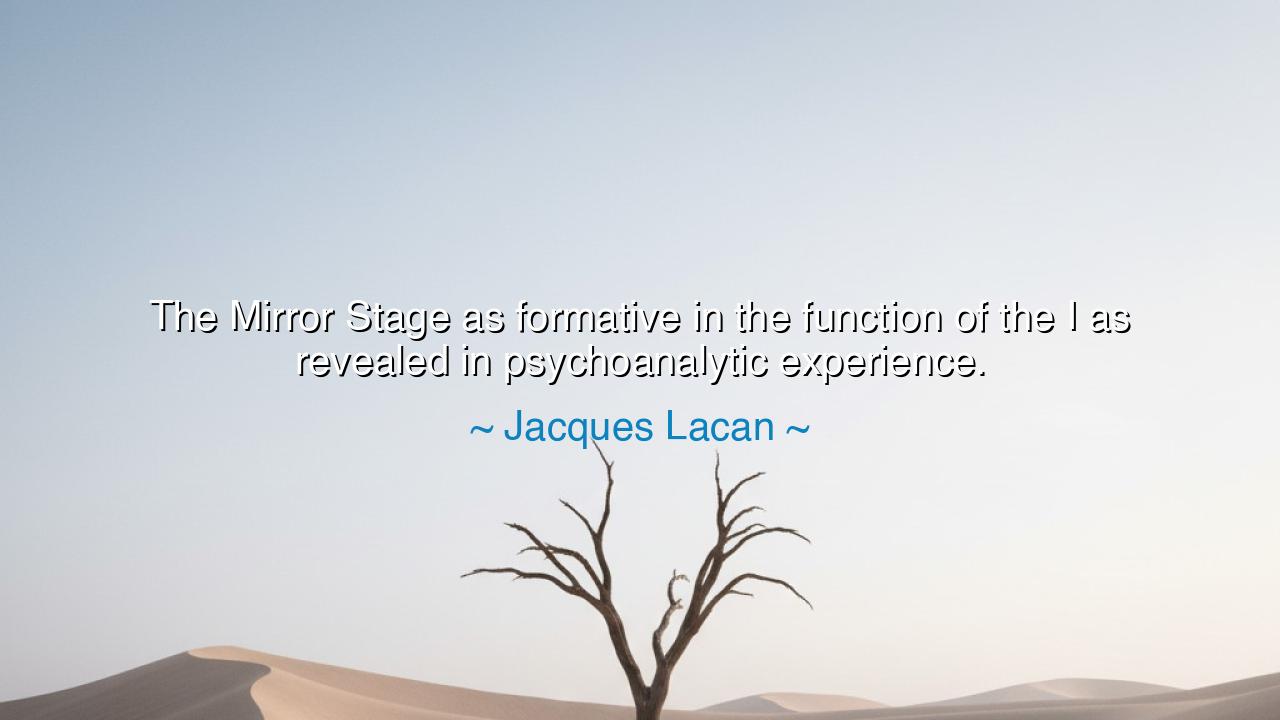
The Mirror Stage as formative in the function of the I as
The Mirror Stage as formative in the function of the I as revealed in psychoanalytic experience.






Host: The dim light of the evening wrapped around the café like a soft embrace, the outside world settling into the quiet of the night. Inside, Jack and Jeeny sat, the conversation between them flowing at its own pace, the words they shared weighed with thought. Jack stirred his coffee, the motion rhythmic and absent as he waited for Jeeny to share what had been on her mind.
Jeeny: She spoke slowly, her voice carrying the weight of the idea. “I came across something today, Jack. A quote from Jacques Lacan: ‘The Mirror Stage as formative in the function of the I as revealed in psychoanalytic experience.’”
Jack: He tilted his head slightly, his eyebrows furrowing as he processed the words. “The Mirror Stage? That sounds like something out of a psychology textbook. What does that even mean? Is it about the literal act of seeing yourself in the mirror?”
Jeeny: She smiled faintly, understanding the confusion. “It’s not just about looking in a mirror, Jack. Lacan’s Mirror Stage is a psychoanalytic theory that suggests that when infants first see their reflection, they begin to form a sense of self. Before that, they are unaware of themselves as distinct beings. The moment they recognize themselves in the mirror — that’s when the I, or the self, begins to take shape.”
Host: The café had grown quieter, as if the conversation had drawn the energy into something more intimate, more focused. Jack, his fingers still wrapped around his cup, seemed lost in the depth of the idea.
Jack: “So, it’s the moment when the child sees their reflection for the first time that they start to understand who they are? But that’s just a physical recognition, right? How does that shape the function of the self?”
Jeeny: Her eyes softened as she explained, her voice steady but filled with the complexity of the idea. “Yes, it’s about the shift from being a fragmented self, where the child doesn’t know where their body ends and the world begins, to a coherent sense of identity. Lacan believes that this recognition is fundamental in shaping how we understand ourselves. But what’s important is that the child is recognizing themselves as an image — a constructed version of the self — which Lacan believes becomes the foundation for how we see ourselves throughout our lives.”
Host: The weight of the conversation seemed to settle in, Jack now sitting back, processing not just Lacan’s theory, but the deeper implications it might have on how people form their sense of identity.
Jack: “So, this mirror moment is crucial in forming how we see ourselves, but it’s not necessarily an accurate reflection of who we truly are. It’s more of a symbolic beginning, the start of our self-awareness, but also the start of a false sense of self?”
Jeeny: “Exactly. The Mirror Stage doesn’t provide a clear or perfect picture of who we are. It’s a formation based on external reflection, which is never fully true to who we really are. Lacan believed that the I we develop from this mirror moment is always somewhat alienated from our true self. It’s like a mask that we carry with us, a symbolic image of who we think we are, but it’s never the full, complete picture.”
Host: The air between them seemed to shift, the complexity of Lacan’s theory adding layers to the conversation. Outside, the world carried on with its usual pace, but inside, there was a quiet understanding that had begun to take root between them. Jack took another sip of his coffee, his expression softening as the weight of the words began to sink in.
Jack: “So, in a way, we spend our lives chasing an image of ourselves that’s shaped by how others see us, how we recognize ourselves in the mirror. But that’s never truly who we are. It’s just a representation, an image that we have to reconcile with the deeper parts of ourselves.”
Jeeny: “Yes, and that’s what makes identity so complicated. The sense of self we create from this mirror image isn’t always the same as who we truly are. It’s shaped by external forces, by what others think of us, and by how we perceive ourselves in relation to those around us. Lacan believed that self-awareness was always somewhat incomplete because of this — we’re always in the process of constructing and deconstructing who we think we are, based on these reflections.”
Host: The room seemed still, the soft hum of background noise fading as the weight of the conversation deepened. Jack sat back, his fingers gently tapping the side of his cup, his mind clearly working through the complexity of Lacan’s ideas.
Jack: “So, we’re always constructing our identities, never fully settled with who we are, because that mirror image is only part of the picture. We’re constantly evolving, shaped by both internal and external forces.”
Jeeny: She nodded, her gaze steady. “Exactly. And Lacan’s idea pushes us to question our self-perception and our constant pursuit of clarity. The I we form from this mirror image is just one part of a much larger and more fluid picture. It’s a process of becoming, not something that’s ever fully fixed or complete.”
Host: The quiet between them deepened, the world outside still moving as usual, but in their corner of the café, there was a shared understanding of Lacan’s theory, and the larger question of how we come to understand ourselves through reflection — both literal and metaphorical. Jack sat back in his chair, his mind spinning with the implications of this idea, knowing that identity was a lifelong process of discovery and questioning, always shaped by both the images we see and the deeper truths that lie beneath.






AAdministratorAdministrator
Welcome, honored guests. Please leave a comment, we will respond soon